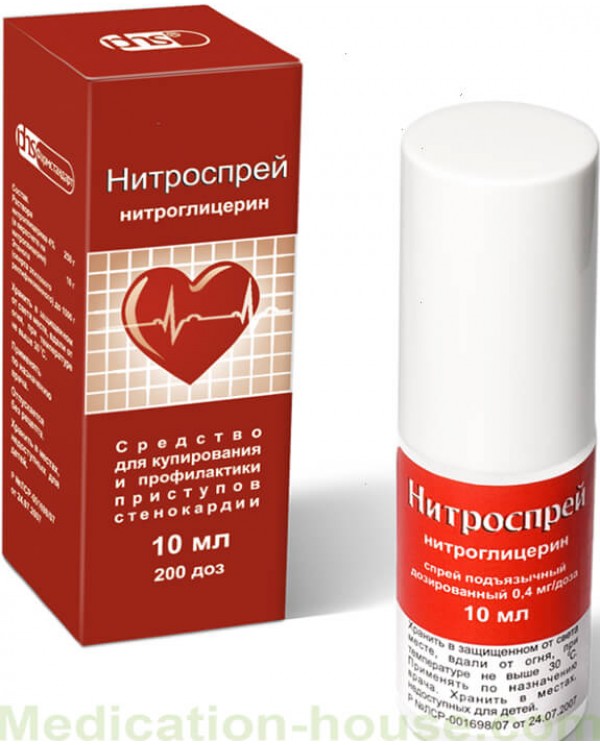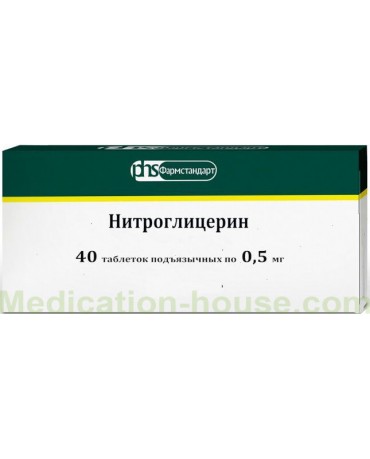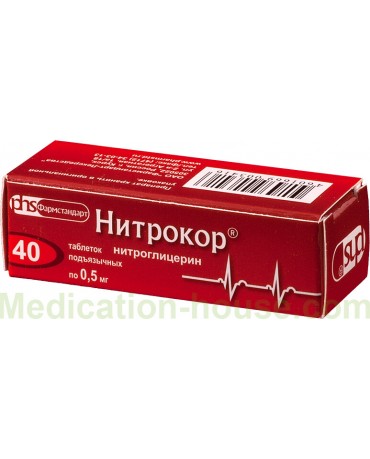User manual for Nitrospray
You can buy Nitrospray on this page
Nitrospray is a vasodilating agent from the group of nitrates; antianginal drug.
Release form and composition
Nitrospray is produced in the form of a dosed sublingual spray: a clear, colorless liquid [10 ml (200 doses) in a polypropylene bottle equipped with a mechanical dosing pump, in a cardboard box 1 bottle complete with a spray nozzle and a protective cap].
Composition of 1 dose:
active substance: nitroglycerin (in the form of a 4% solution) - 0.4 mg;
additional component: ethanol (rectified ethyl alcohol).
Pharmacodynamics
Nitrospray is a peripheral vasodilator that predominantly affects venous vessels.
The mechanism of action of nitroglycerin, the active substance of the drug, is based on its ability to release nitric oxide from its molecule, which is a natural endothelial relaxing factor. This compound provides an increase in the intracellular concentration of cyclic guanosine monophosphatase, thereby preventing the penetration of calcium ions into smooth muscle cells and causing them to relax. The result of relaxation of the smooth muscles of the vascular wall is vasodilation, which leads to a decrease in venous return to the heart (preload) and resistance of the systemic circulation (afterload). At the same time, the work of the heart decreases and the need for myocardial oxygen decreases.
Against the background of the drug-induced expansion of the coronary vessels, coronary blood flow improves and is redistributed in the area with insufficient blood supply, which contributes to an increase in oxygen delivery to the heart muscle. A decrease in the return of venous blood reduces filling pressure, helps to normalize blood supply to the subendocardial layers, lowers pressure in the pulmonary circulation, and leads to a gradual relief of symptoms in pulmonary edema.
By suppressing the vascular component that forms the pain syndrome, nitroglycerin demonstrates a central inhibitory effect on the sympathetic vascular tone. The substance also helps to relax the smooth muscle cells of the bronchi, small and large intestines, esophagus, bile ducts, gallbladder, urinary tract. The action of Nitrospray is quickly manifested, the effect develops within 1–1.5 minutes and is noted within about 30 minutes.
Pharmacokinetics
With sublingual use (absorption under the tongue), nitroglycerin is rapidly and completely absorbed into the systemic circulation from the surface of the oral mucosa. The bioavailability of the substance is 100%, since its primary hepatic degradation does not occur with sublingual administration.
The maximum concentration (Cmax) in blood plasma is observed 4 minutes after taking the drug. The connection with blood plasma proteins is approximately 60%. The substance is characterized by a rapid process of metabolic transformation with the participation of nitrate reductase, during which di- and mononitrates are formed (only isosorbide-5-mononitrate is active) and the final product is glycerol. Nitroglycerin is excreted by the kidneys in the form of metabolites, less than 1% of the dose is excreted unchanged, the total clearance is 25–30 l / min.
After taking Nitrospray, the half-life (T½) of the drug from the blood plasma is 2.5-4.4 minutes. Circulating nitroglycerin is strongly associated with erythrocytes, its accumulation is noted in the walls of blood vessels.
Indications for use
angina attacks - for the purpose of relief and prevention (prevention of attacks by taking before exercise);
acute left ventricular failure (including against the background of acute myocardial infarction).
Contraindications
Absolute:
age under 18;
severe arterial hypotension;
increased intracranial pressure caused by trauma or cerebral hemorrhage;
angle-closure glaucoma;
concomitant use with phosphodiesterase inhibitors;
hypersensitivity to organic nitrates.
Relative (it is recommended to take Nitrospray with extreme caution, since there is a risk of complications):
chronic heart failure, accompanied by low filling pressure of the left ventricle [due to the threat of a decrease in blood pressure (BP) and the development of tachycardia, which can increase ischemia];
acute myocardial infarction with low left ventricular filling pressure;
severe anemia;
hypertrophic cardiomyopathy (due to the possible increase in angina attacks);
thyrotoxicosis;
severe renal failure;
liver failure.
Instructions for use of Nitrospray: method and dosage
The drug is used sublingually. To avoid the development of complications, Nitrospray should be taken on the recommendation of your doctor.
Before spraying the spray, the balloon should not be shaken; during the procedure, it is advisable to be in a sitting position if possible. To take the product, you need to hold the balloon vertically, remove the protective cap from it, then open your mouth and hold your breath for a few seconds, press the balloon once, directing the stream of the drug under the tongue. Closing your mouth, you must try not to swallow the drug for a while.
In the case of the first use of the product or after a long break in administration, it is required to release one dose into the air before direct administration of the spray to fill the aerosol chamber.
Recommended doses and frequency of administration of Nitrospray:
relief of an attack of angina pectoris: at the first attack, 1 or 2 doses (0.4 or 0.8 mg) should be administered under the tongue; if the effect is insufficient, spraying can be repeated at 5-minute intervals; if, after sublingual administration of 3 doses within 15 minutes, the attack could not be stopped, you must immediately consult a doctor;
prevention of an attack of angina pectoris: 5-10 minutes before possible stress or expected load, 1 dose (0.4 mg) should be used.
The maximum single dose of Nitrospray should not exceed 1.6 mg of nitroglycerin (4 doses), the maximum daily dose is 6.4 mg (16 doses).
Side effects
central nervous system: feeling of weakness, headache (especially at the beginning of therapy, with prolonged use - decreases); rarely - lethargy, anxiety, psychotic reactions, disorientation;
cardiovascular system: fever, tachycardia, facial flushing, dizziness, decreased blood pressure; rarely (mainly in case of overdose) - cyanosis, orthostatic collapse;
allergic reactions: rarely - itching, skin rash;
digestive system: dry mouth; rarely - nausea, abdominal pain, vomiting;
local reactions: burning sensation under the tongue;
others: rarely - methemoglobinemia, hypothermia, blurred vision.
Overdose
Overdose symptoms may include: decreased blood pressure, headache, reflex tachycardia, orthostatic hypotension, facial flushing, fever, dizziness, diarrhea, vomiting, increased drowsiness, asthenia. When using very high doses (more than 20 mg / kg), methemoglobinemia, cyanosis, dyspnoea and tachypnea, orthostatic collapse may occur.
In case of mild manifestations of an overdose, it is recommended to transfer the patient to the supine position, lifting his legs. In severe cases, general methods of treatment of intoxication and shock are prescribed - they replenish the circulating blood volume, inject norepinephrine and / or dopamine, etc. Use of epinephrine (adrenaline) is contraindicated.
If the development of methemoglobinemia is observed, intravenous administration of vitamin C (or in the form of sodium salt) at a dose of 1000 mg, 1% solution of methylene blue at a dose of up to 50 ml, toluidine blue at an initial dose of 2–4 mg / kg, is prescribed 2 mg / kg. Also, with the appearance of this complication, it is possible to carry out hemodialysis, oxygen therapy, exchange blood transfusion.
Special instructions
During the period of application of Nitrospray, it is strictly forbidden to consume ethanol-containing drinks.
Due to the increased risk of orthostatic reactions during treatment, caution is required in the event of a sharp change in body position, prolonged standing, exercise, as well as in hot weather.
Nitroglycerin enhances the excretion of vanillyl mandelic acid and catecholamines in the urine from the body.
It is necessary to cancel Nitrospray gradually and under the supervision of a doctor.
Influence on the ability to drive vehicles and complex mechanisms
At the beginning of the course of therapy, it is required to refrain from working with complex mechanisms and driving vehicles. In the future, the expansion of the restrictions should be set individually for each patient.
Application during pregnancy and lactation
There is no information on the penetration of the drug into breast milk.
During pregnancy and lactation, the use of Nitrospray is allowed only under strict medical supervision after a careful comparison of the intended benefits of treatment for the mother and the possible threat to the health of the fetus / child.
Childhood use
According to the instructions, Nitrospray is not prescribed for children and adolescents under 18 years of age due to insufficient clinical data.
With impaired renal function
In the presence of severe renal failure, the drug should be taken with caution.
For violations of liver function
In the presence of hepatic impairment, the use of Nitrospray is required with caution due to the aggravation of the risk of methemoglobinemia.
Drug interactions
monoamine oxidase inhibitors, other antihypertensive drugs and vasodilators (slow calcium channel blockers, beta-blockers), tricyclic antidepressants, antipsychotics, angiotensin-converting enzyme inhibitors, phosphodiesterase type 5 inhibitors (vardenafil, siltadinamalafil) nitroglycerin;
novocainamide, quinidine - the threat of orthostatic collapse is aggravated;
heparin - a decrease in its anticoagulant effect is possible;
dihydroergotamine - the effect of this drug is enhanced.
Terms and conditions of storage
Store in a place out of the reach of children, protected from light penetration and away from open flames, at temperatures up to 30 ° C.
Shelf life is 3 years.
Reviews about Nitrospray
According to reviews, Nitrospray is an easy-to-use tool that effectively and quickly relieves angina attacks.
At the same time, many patients who took the drug note that in some cases it can drastically reduce blood pressure, which is why it is recommended to be at rest for some time after taking the drug.
The disadvantages of the drug include a large number of contraindications, as well as the development of undesirable reactions, mainly such as headache, weakness throughout the body, nausea, vomiting. All patients consider Nitrospray a serious drug that should be taken only strictly according to indications in recommended doses.
Terms of sell
You don't need a prescription to buy Nitrospray.



